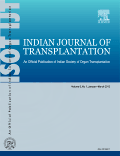
Indian Journal of Transplantation
Scope & Guideline
Fostering Collaboration in Transplant Research
Introduction
Aims and Scopes
- Clinical Transplantation Research:
The journal publishes original articles that explore various aspects of organ transplantation, including kidney, liver, and other organ transplants, with a focus on clinical outcomes, complications, and innovative surgical techniques. - Immunology and Immunosuppression:
Significant research is dedicated to understanding the immunological aspects of transplantation, including the role of antibodies, rejection mechanisms, and the development of immunosuppressive therapies to improve graft survival. - Infectious Disease Management:
Given the susceptibility of transplant recipients to infections, the journal addresses the epidemiology, diagnosis, and management of infections in the post-transplant population. - Psychosocial and Ethical Considerations:
Research on the psychosocial factors affecting organ donation, recipient outcomes, and ethical issues surrounding transplantation practices is a critical area of focus. - Emerging Technologies and Innovations:
The journal highlights advancements in transplantation technologies, including new surgical techniques, biomarker development for monitoring graft health, and the integration of telemedicine in transplant care. - Public Awareness and Education:
There is a commitment to improving public knowledge and attitudes towards organ donation and transplantation, with studies assessing awareness levels and educational interventions.
Trending and Emerging
- COVID-19 and Transplantation:
Research examining the impact of COVID-19 on transplant recipients, including infection rates, vaccination responses, and management strategies, has surged, reflecting the pandemic's significant influence on healthcare. - Personalized Medicine in Transplantation:
There is a growing focus on personalized approaches to immunosuppression, including pharmacogenomics and tailored immunosuppressive regimens, aiming to enhance graft outcomes and minimize adverse effects. - Xenotransplantation:
The exploration of xenotransplantation as a potential solution to organ shortages is gaining traction, with studies investigating the ethical, immunological, and technical aspects of this innovative field. - Emerging Infectious Diseases:
Research addressing the challenges posed by new infectious diseases in transplant recipients, including opportunistic infections and their management, is on the rise as global health dynamics change. - Telemedicine in Transplant Care:
The adoption of telemedicine for follow-up care and patient management has become increasingly relevant, particularly post-COVID-19, highlighting the need for remote monitoring and consultation. - Health Equity in Transplantation:
Emerging themes around health equity, access to transplantation, and disparities in outcomes among different populations are gaining attention, reflecting a broader societal focus on equality in healthcare.
Declining or Waning
- Traditional Surgical Techniques:
Research focusing on conventional surgical methods for organ transplantation has decreased as newer, less invasive techniques gain popularity and acceptance within the transplant community. - Basic Science Studies:
There appears to be a reduction in basic science research related to transplantation biology, possibly due to a shift towards more clinically applicable studies that directly impact patient care. - Longitudinal Studies on Graft Survival:
While still important, the frequency of longitudinal studies that primarily focus on long-term graft survival rates without integrating new variables or technologies has diminished. - Pharmacology of Older Immunosuppressants:
Research focusing on older immunosuppressive agents, such as cyclosporine and azathioprine, is declining as the field moves towards exploring novel agents and personalized medicine approaches. - Historical Reviews:
The journal has seen fewer articles dedicated solely to historical perspectives in transplantation, reflecting a trend towards contemporary issues and current practices.
Similar Journals
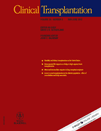
CLINICAL TRANSPLANTATION
Fostering Excellence in Clinical Transplant ResearchClinical Transplantation is a leading journal in the field of transplantation medicine, published by Wiley. With an ISSN of 0902-0063 and an E-ISSN of 1399-0012, this prestigious journal has been pivotal in advancing the understanding of clinical practices and innovative research in transplantation since its inception in 1989. Based in the United Kingdom, it is recognized within the Category Quartiles as Q2 in Transplantation and boasts a respectable Scopus rank, placing it #20 out of 54 in its field, highlighting its significance. The journal serves as a platform for disseminating peer-reviewed articles that encompass a wide range of topics, from organ transplantation techniques to post-operative care and immunology, catering to researchers, healthcare professionals, and students alike. As the field progresses towards more personalized and effective treatment approaches, Clinical Transplantation remains committed to providing insight and fostering excellence in research for the global transplantation community.

Transplantation Reviews
Elevating surgical practices with expert insights and reviews.Transplantation Reviews is a premier scholarly journal published by Elsevier Science Inc, dedicated to advancing the field of transplantation and surgery. With an impressive impact factor and categorized in the top quartile (Q1) for both Surgery and Transplantation as of 2023, this journal prominently ranks in the 96th and 86th percentiles for its respective disciplines. Since its inception in 1987, it has provided a vital platform for researchers and professionals to disseminate high-quality, peer-reviewed articles that reflect the latest advancements and challenges in transplantation science. Although the journal is not currently open access, it remains a key resource for academic libraries and institutions. By fostering discussions and providing insights into clinical practices, Transplantation Reviews serves to enhance understanding and improve outcomes in the ever-evolving field of transplantation, making it an essential read for anyone engaged in this dynamic area of medicine.

International Journal of Organ Transplantation Medicine
Advancing the Frontiers of Transplantation MedicineThe International Journal of Organ Transplantation Medicine, published by the Avicenna Organ Transplant Center, stands as a vital resource for the field of transplantation medicine. Established to advance scientific knowledge and clinical practices, this open access journal has been supporting the global research community since 2010, ensuring that groundbreaking findings are easily accessible to researchers, professionals, and students alike. With its ISSN of 2008-6490 and E-ISSN 2008-6482, the journal consistently showcases high-quality, peer-reviewed articles, addressing critical advancements in transplantation techniques, patient care, and immunology. Renowned for its commitment to excellence, it holds a Q3 ranking in transplantation for 2023 and ranks #32 out of 54 in the Scopus medicine transplantation category, placing it in the 41st percentile. Researchers are encouraged to submit their work, contributing to the journal's goal of improving outcomes in organ transplantation and fostering collaboration across disciplines.

Experimental and Clinical Transplantation
Exploring Breakthroughs in Transplant MedicineExperimental and Clinical Transplantation is a distinguished journal published by Baskent University in Turkey, dedicated to advancing the field of transplantation through innovative research and clinical insights. Established in 2003, the journal has rapidly gained recognition within the academic community, currently holding a Q3 ranking in the field of Transplantation for 2023, as evidenced by its position in the Scopus ranking for the discipline. With an emphasis on both experimental and clinical studies, this journal serves as a crucial platform for sharing breakthroughs in transplant medicine, immunology, and post-operative care strategies. Although it operates under a restricted access policy, the journal seeks to bridge the gap between research findings and practical applications in clinical settings, making it invaluable for researchers, healthcare professionals, and students alike who are keen on exploring advancements in the transplantation landscape. Through its commitment to quality and innovation, Experimental and Clinical Transplantation contributes significantly to enhancing patient outcomes and fostering scholarly dialogue in the transplantation community.

Progress in Transplantation
Leading the Charge in Transplantation AdvancementsProgress in Transplantation is a leading journal published by SAGE Publications Inc, focusing on the dynamic field of transplantation medicine. With an ISSN of 1526-9248 and E-ISSN 2164-6708, this journal serves as a crucial platform for researchers and clinicians aiming to share cutting-edge findings and advancements in organ transplantation. Despite not being an Open Access journal, it provides a significant contribution to the academic community, evidenced by its placement in the Q3 category of Transplantation for 2023 and its ranking of #33 out of 54 in Scopus, showcasing a percentile standing of 39th. Progress in Transplantation has been dedicated to publishing high-quality research since its inception in 2000, and it continues to be a vital resource for those seeking to enrich their knowledge and foster innovation within the field of transplantation, fostering collaboration among practitioners, researchers, and students alike.

Turkish Journal of Nephrology
Fostering knowledge exchange in nephrology and surgery.Turkish Journal of Nephrology, published by AVES, serves as a pivotal platform for disseminating significant research in the domains of nephrology, transplantation, and surgery. Since its establishment as an Open Access journal in 2019, it has gained traction for delivering high-quality, peer-reviewed articles that reflect the latest advancements and practices in these critical medical fields. Based in Turkey, this journal has rapidly become an important resource, particularly for researchers and healthcare professionals striving to enhance kidney healthcare strategies. Despite being categorized in the fourth quartile across its main categories for 2023 and having modest rankings within Scopus, its commitment to openness and accessibility fosters a collaborative academic environment that promotes knowledge sharing. We encourage scholars, practitioners, and students to engage with the journal's content to further drive innovation and improve patient outcomes in nephrology and associated disciplines.

TRANSPLANT INTERNATIONAL
Connecting Innovators in Organ TransplantationTRANSPLANT INTERNATIONAL is a premier open-access journal in the field of transplantation, published by Frontiers Media SA since 1988. With its dedicated scope encompassing the latest research and advancements in organ transplantation and related fields, this journal serves as an essential resource for researchers, clinicians, and healthcare professionals engaged in transplantation medicine. Boasting an impressive 2023 Scopus rank of #17 out of 54 in the Medicine - Transplantation category and a Q2 quartile ranking, it has established itself as a vital publication platform contributing to the global discourse on transplant innovations. As an open-access journal since 2022, TRANSPLANT INTERNATIONAL enhances the dissemination of knowledge, ensuring that pivotal findings are accessible to a broader audience, thereby fostering advancements in patient care and clinical practices. With its base in Italy and operations managed from Lausanne, Switzerland, the journal promises to remain at the forefront of transplantation research through 2024 and beyond.
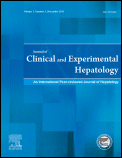
Journal of Clinical and Experimental Hepatology
Unveiling the latest in liver research and treatment.The Journal of Clinical and Experimental Hepatology, published by Elsevier - Division Reed Elsevier India Pvt Ltd, is a premier platform dedicated to advancing the field of hepatology. With an ISSN of 0973-6883 and an E-ISSN of 2213-3453, this journal has gained recognition for its impactful contributions to both clinical practice and scientific research in the domain of liver health. Ranking in the Q2 quartile for Hepatology in 2023 and positioned at 33rd out of 82 in Scopus’s Hepatology category, it reflects a robust impact factor and a commitment to publishing high-quality, peer-reviewed articles. Researchers, clinicians, and students can engage with a wealth of open-access content covering the latest advancements, challenges, and insights in hepatology, as the journal aims to disseminate knowledge from 2011 through 2025. Join the community of experts as we explore critical developments in the understanding and treatment of liver diseases.
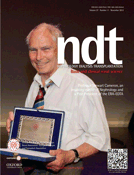
NEPHROLOGY DIALYSIS TRANSPLANTATION
Advancing renal research for a healthier tomorrow.NEPHROLOGY DIALYSIS TRANSPLANTATION is a premier academic journal published by Oxford University Press that plays a vital role in disseminating cutting-edge research within the fields of nephrology and transplantation. With an impressive impact factor and recognition as Q1 in both these categories for 2023, the journal ranks among the top publications in medicine, enhancing its visibility among a global audience of researchers, healthcare professionals, and students. Established in 1986, the journal has maintained a commitment to publishing high-quality, peer-reviewed articles that contribute to the advancement of knowledge and practice in renal medicine. Although this journal does not offer open access options, it remains a highly regarded resource due to its rigorous selection process and influential contributions to the field. Scholars are encouraged to explore the journal’s extensive archive, spanning from 1986 to 2024, for invaluable insights and developments in nephrology and transplantation.
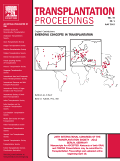
TRANSPLANTATION PROCEEDINGS
Advancing the Frontiers of Transplant Medicine.TRANSPLANTATION PROCEEDINGS is a distinguished journal published by Elsevier Science Inc, focused on the field of transplantation and surgery. With a publication history spanning over five decades, from 1969 to 2024, this journal has consistently provided a platform for researchers and practitioners to share significant findings and advancements in organ transplantation and related surgical techniques. The journal is renowned for its rigorous peer-review process and has achieved a respectable impact factor within its categories, ranking in the Q3 quartile for both Surgery and Transplantation as of 2023. With Scopus rankings placing it in the 47th percentile in Medicine (Surgery) and the 43rd percentile in Medicine (Transplantation), TRANSPLANTATION PROCEEDINGS serves as a vital resource for academics and medical professionals seeking to stay updated on the latest empirical research, clinical practices, and innovative methodologies in the field. While it does not operate under an open-access model, the journal ensures that critical insights and data are accessible to its audience, enhancing the global discourse in transplantation science. For those dedicated to advancing transplant medicine, this journal represents an invaluable collection of knowledge and a forum for fostering innovative approaches to improve patient outcomes.